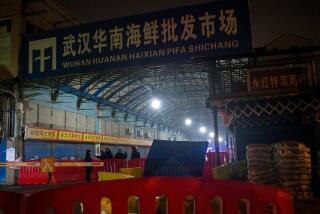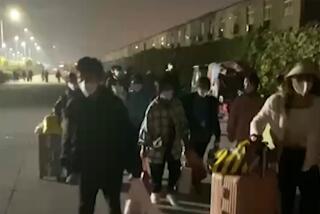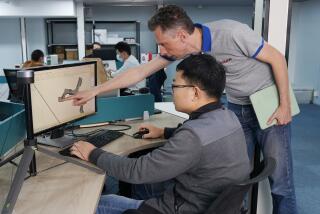SARS Forces Firms to Be Creative in Approach to Business in Asia
- Share via
James Chow made sure he was downwind and several feet away from his boss, Ed Meadows. They were both shivering; it was a cold spring day in Santa Ana. But they couldn’t go indoors because Chow might be a carrier. He didn’t want to be the one to infect the president of CenDyne Inc.
For four hours Sunday, the two men sat outside a coffee shop and talked business. Afternoon turned to evening. They hoped the wind didn’t change direction. Then Chow, the computer products maker’s Far East representative, went to the airport and flew back to southern China, the hot zone for severe acute respiratory syndrome, or SARS, which has infected at least 3,293 people, killing 159.
After Chow’s departure, Meadows put in a call to the Westin Hotel in Costa Mesa, where three Taiwanese engineers were due in that evening. He arranged to have them stay at the hotel for five days, a sort of mini-quarantine. If they didn’t show any signs of illness, they could come to the company. Until then, they had to meet their U.S. colleagues outdoors or talk by phone.
It sounds extreme, but in the new post-SARS world, global companies such as CenDyne, one of the world’s largest producers of CD burners, aren’t taking any chances. With the death toll mounting by the day in places as far apart as Hanoi, Hong Kong and Toronto, executives are willing to try almost anything to keep their companies on track without endangering themselves or employees.
“This could cripple our business,” said an exhausted Mo Vahdati, CenDyne’s chief executive, who has been working through the night trying to manage a complex Asian manufacturing network from the firm’s Santa Ana headquarters.
Add the threat of SARS to a fragile global economic picture and the world feels like a very perilous place to do business. CenDyne’s struggles are shared by thousands of California firms, whose dependence on Asian trade and travel leave them vulnerable to these emerging threats, whether from a bomb in a shipping container or a virus carried by a visitor.
California’s dependence on trade -- the state exported $92.2 billion in goods last year -- became painfully clear in November, when the 10-day shutdown of the West Coast ports caused millions of dollars in damages, including the shutdown of auto assembly lines and the loss of containers of perishable fruits and vegetables.
Much like the attacks of Sept. 11 brought home to Americans the realization that they no longer were safe from terrorists within their own country, the spread of SARS has reminded nervous executives that their interconnected world can be a pathway to pain as well as prosperity.
“I think the expectation that [globalization] would be a smooth, direct process no longer holds true,” said Daniel Yergin, chairman of Cambridge Energy Research Associates and producer of a television series on globalization that will air on PBS next month. “There’s a sense of risk that wasn’t there a few years ago.”
Every day that the SARS virus continues its unpredictable march, more companies are forced to make decisions that will have an effect on buying trips, factory production schedules and the availability of goods on store shelves at Christmas. As those individual decisions ripple around the world, their combined effects pose an additional threat to economies already slowed by the war in Iraq and the global downturn.
SARS has not come close to epidemic levels with a 4.8% death rate. Influenza-related complications, by comparison, kill an average 36,000 Americans each year. But even though scientists have identified the genetic code of the coronavirus that causes SARS, they still don’t know exactly where the disease originated, how it is transmitted and how to cure it.
Over the weekend, the World Health Organization issued a warning that SARS could become the “first severe new disease of the 21st century with global epidemic potential.”
The biggest question mark is China, which had weathered the recent global slump by boosting exports and government spending. This week, Chinese President Hu Jintao toured the southern China province that is the epicenter of the disease, saying he was “very worried” about the threat posed by SARS. The Chinese government has been criticized for not fully disclosing the extent of the illness and the dangers it poses to its citizens.
U.S. firms are watching anxiously for signs that the virus has migrated to factories in China that are leading suppliers of apparel, toys, footwear and light electronics. The Pearl River Delta has been a breeding ground for disease because of the crowded conditions, the proximity of farms and cities, and a huge migrant workforce. It was in the city of Foshan that the first known SARS case was reported in November.
“If it moves to manufacturing all at once, that’s what everybody is afraid of,” said Maureen Lewis, an economist with the World Bank in Washington who has studied the economic effects of epidemics.
CenDyne, one of the world’s leading suppliers of optical storage and PC peripheral products, was launched in 1999 by Meadows and the Vahdati brothers, Mo and Dean. As the world’s electronic manufacturers moved to southern China, CenDyne followed to take advantage of low-cost labor and cheap raw materials and components. Last year, Test-Rite Group, a Taiwan-based trading company with extensive business on the mainland, purchased a 42% stake in the Orange County company.
In December, Meadows, CenDyne’s president, received an e-mail from an employee in China warning him to “be careful” because there was a strange disease going around the Shenzhen area. However, others in Asia told him to ignore those reports, insisting that “people were just spreading bad rumors trying to hurt China.”
In January and February, Chow, Meadows, Mo Vahdati and a Test-Rite executive became violently ill after trips to China. Their symptoms were similar to SARS: high fever, chills and a cough. Their doctors could not find the cause of their illness, but all recovered within two to five weeks.
“I knew then that I would not go back,” said Meadows, who still wonders whether he had a mild case of SARS. “I was so sick and miserable.”
But Vahdati, the company’s hard-driving chief executive, refused to quit traveling. He says he now feels guilty that he strong-armed his reluctant Taiwanese engineering specialist, Tom Chen, into accompanying him on a round of factory visits in the Foshan area in mid-March.
By the time Vahdati returned from that trip, the Centers for Disease Control and Prevention had issued an advisory against traveling to the region and panic was emptying Hong Kong hotels and Asian airlines. The turning point for CenDyne was when health officials speculated that the disease might be transmitted through the air or on inanimate objects.
Suddenly, getting on an airplane began to feel more like taking a turn at the roulette wheel.
“It’s not just your life,” said Meadows, a veteran traveler. “It’s all the people around you. It’s your wife, your daughter, the people who you like at work. It’s the people you meet at the Starbucks.”
But managing an overseas operation from afar is proving tougher than expected. CenDyne can’t afford a production slowdown or stoppage. The factories in southern China that manufacture its products are working on tight delivery schedules for retailers such as Office Max and Staples. Vahdati is particularly worried about the launch of CenDyne’s new line of consumer products, which were supposed to be on store shelves by Labor Day.
“This is the life of the company,” he said, pointing to two prototypes sitting on his desk. One is a video disc recorder that can copy up to 50 hours of television programming on a small, cigarette box-sized hard drive. The disc is portable and can be plugged into a television or a computer with a cable. The second device is a take-off on a DVD recorder, the details of which the company is not ready to disclose.
Meeting that fall deadline means having the samples ready for a sales campaign in May and factories geared up to begin production in June. Routine matters can be handled by e-mail, phone or teleconference.
But some things require face-to-face contact, according to CenDyne executives. Those include negotiating contracts, developing a marketing plan and helping Chinese engineers perfect the “look and feel” of the new devices.
Vahdati has been trying to conduct his design sessions by phone, usually between 6 p.m. and midnight, when it is daytime in Asia. But simple matters inevitably turn into frustrating conversations complicated by linguistic and cultural confusion. Recently, he tried to explain that he wanted a square button -- not a round one -- on the front of the videodisc recorder. He finally gave up and said he would e-mail a photo. “You can’t do manufacturing by phone,” he said.
CenDyne executives say SARS has not shaken their confidence in China as a global manufacturing base. But the company isn’t taking any chances. As a security measure, CenDyne is looking into alternative manufacturing facilities in Thailand or Malaysia for its new product line.
More to Read
Inside the business of entertainment
The Wide Shot brings you news, analysis and insights on everything from streaming wars to production — and what it all means for the future.
You may occasionally receive promotional content from the Los Angeles Times.










